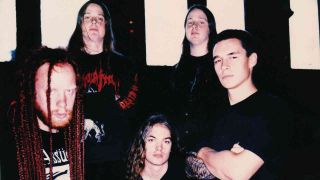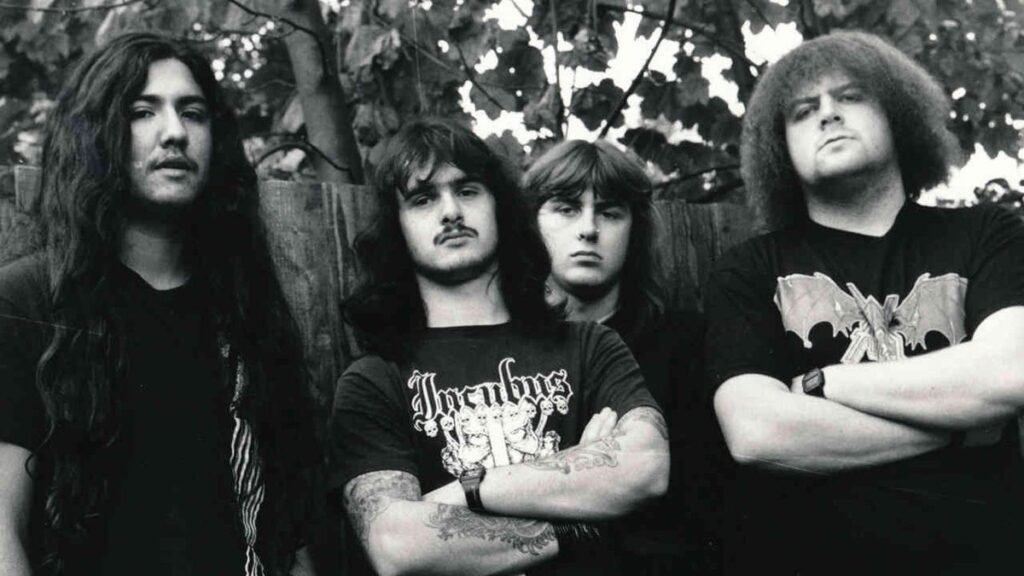Few steel labels had been as influential as Earache Information. The Nottingham, UK-based corporate was once pivotal in shaping the intense steel scene by way of albums from the likes of Napalm Loss of life, Morbid Angel, Entombed, Godflesh and numerous others. In 2013, label founder Digby Pearson seemed again at the historical past of steel’s maximum ground-breaking label.
From flexi discs to supporters of the underground steel scene. From nearly growing the grindcore style to signing essentially the most acclaimed blues- rockers in their technology. From places of work in Nottingham to… neatly, places of work in Nottingham. The tale of Earache Information’ 25 years has been one thing of a big experience, taking with it probably the most greatest and maximum essential names in steel.
The tale in reality starts in 1985, when a tender, idealistic Digby Pearson determined to check out his hand at freeing data from a few of his favorite hardcore and punk bands.
“I used to be a large fan of the scene and knew numerous the bands. In truth, I had helped to market it and the following logical step was once to position out data through a few of these bands,” says Digby.
On the other hand, Digby had no wisdom on the time of what it took to free up a report. All he needed to force him ahead was once a single-minded choice.
“Me and my mate Kalv, who was once the bassist in Heresy, pooled our cash and bought off our report collections so lets scrape in combination sufficient money to finance some data. We did two compilations, that includes bands like The Stupids and Septic Loss of life (the latter incorporated Pushead, who’d cross directly to make an enormous title for himself as a graphic artist operating with the likes of Metallica) and a Heresy EP (By no means Healed). We pressed them up as flexi discs, which have been moderately fashionable on the time. Magazines had been gifting away flexis, they usually had been inexpensive to fabricate than the standard vinyl.”
On the time, Digby and Kalv weren’t operating a right kind label. They’d no clue methods to get distribution looked after out for those releases. However, because of an innate trade sense and crafty, Digby was once ready to make sure those data bought.
“I had an inventory of contacts world wide, and thru them we controlled to promote about 5,000 copies. They had been my distribution community. The purpose, in fact, was once to make again the cash we’d spent, and in addition in an effort to give bands one thing as neatly. As we advanced I began to change into moderately just right on the trade facet of items. I in reality felt at house.”

Via this juncture, Digby had hand over college and was once additionally unemployed, however in 1987 a central authority scheme persuaded him to arrange Earache as a valid report label.
“One thing referred to as the Endeavor Allowance Scheme had simply are available in. This inspired younger other folks to arrange their very own companies. They gave you some monetary assist, and every- one I knew was once at the scheme. It happened to me that I may get my very own label going. I already had the Earache title, however I used to be operating issues alone. There was once no workforce.”
The primary free up during the fledgling Earache label was once The Go back Of Martha Splatterhead from Seattle punk band The Accused, and Digby temporarily discovered the most important trade lesson with this album.
“I had no thought about methods to get data into the department stores,” he explains. “The flexi discs were advertised via my mailing checklist, however I sought after Earache to move ‘official’, so I had to kind out a distribution deal. A man referred to as Tim Bennett, who ran the Kids Of The Revolution (COR) label, presented to assist. He were given a deal looked after with an organization referred to as Revolver, who had been a part of The Cartel, they usually handled small unbiased labels like mine. So it was once agreed that The Accused album would if truth be told pop out on each Earache and COR, and it’s the one time I’ve ever put out any report along with some other label. It was once an enormous mistake.”
Financially bruised from the come across, Digby determined to move it on my own. Fortunately, Revolver had been inspired sufficient to enroll Earache without delay, the following free up being a Hirax/Concrete Sox cut up report. Nevertheless it was once the following report that was once no longer best to make the baby corporate’s popularity, but in addition get started a musical revolution. It was once Scum, the debut from Napalm Loss of life.
“I’d recognized the fellows for ages. I’d pushed with them to such a lot of in their gigs they usually’d stayed spherical my space. They sought after to free up a cut up album with some other band. In truth, they’d already cut up up after recording Scum, and didn’t in reality care about it. However I all the time idea it must be a standalone Napalm Loss of life report, and persuaded drummer Mick Harris to position in combination a brand new lineup to report extra subject material. That’s why there are two other bands concerned with the report. Facet One of the most vinyl has the primary band and Facet Two has the second one.”
Scum proved to be a sensation when it was once put out through Earache in June 1987 – it successfully kickstarted the entire grindcore scene.
“Grindcore was once brutal loss of life steel with hardcore leanings put via an accelerator. The object about Napalm was once that they appealed to steel fanatics and in addition to hardcore ones. The lineup that did the second one facet of the album had two metalheads – guitarist Invoice Steer and bassist Shane Embury – and two punks – vocalist Lee Dorrian and Mick Harris – and the mix was once simply wonderful. To me, this was once experimental track. Napalm Loss of life had been pushing the envelope on such a lot of ranges.”
What additionally helped the band, style and label’s reason was once the patronage of tastemaking UK DJ John Peel.
“I best despatched out 8 promo copies of the report to the media – not like nowadays when it kind of feels like we ship out hundreds – and John Peel picked up on it instantly. He performed Scum on his Radio One display, and it gave us necessary publicity. Because of this to some degree, Napalm Loss of life were given to the highest of the indie charts, forward of The Smiths and New Order, who had been so fashionable again then.”
Because the grindcore scene grew, so did Earache’s credibility, as Digby explains:
“I believe I’m proper in announcing that seven of the primary 10 bands to get releases at the label were given Peel periods, which was once a in reality top proportion. That resulted in a snowball impact. However the entire thing was once very a lot a grass- roots factor. There have been no idiots concerned with those bands, nor someone preaching dodgy politics. Individuals who had been a part of it had been very a lot right down to earth and actual.”
After all, no longer everybody had Digby’s imaginative and prescient on the time. Whilst he may see the grindcore motion amassing an unmistakable and unstoppable momentum, some of the founders was once extra sceptical.
“I have in mind [future Godflesh frontman] Justin Broadrick, who was once within the first Napalm Loss of life lineup, telling me that it wouldn’t remaining and that it was once only a passing development. He even determined to enroll in Head Of David, whom he believed would have extra longevity. Now I imply no disrespect to Head Of David – they had been a just right band on Blast First, a high quality label – however I did surprise how he felt when Napalm bought out the Kilburn Nationwide in 1989.”
This was once the similar 12 months that what had began as a one-man label from Digby’s bed room moved into places of work.
“We had been nonetheless in Nottingham, and the ones are the similar places of work now we have nowadays. It was once by no means a luxurious, company set-up. There are all the time packing containers cluttering up the gap, stuffed with CDs, vinyl or posters. I by no means noticed the purpose in having place of job furnishings. All I’ve is a table, a refrigerator…and a plasma tv.”
One of the most key tactics through which Earache expanded their roster was once through on the lookout for thrilling bands on a world scale.
“That was once the name of the game to the way in which through which grindcore took grasp. It took place in such a lot of other nations, and we had been there, signing up the most efficient. We even went to Poland to get Vader. Once they first arrived, none of them may discuss a phrase of English. I will be able to’t believe now how we communicated with them. Nevertheless it was once thrilling to have bands like them from puts with out a earlier historical past for just right bands.”
The usa was once additionally to turn out a wholesome searching floor for the label. “The entire grindcore factor in reality resonated with American citizens,” says Digby. “Our bands had been being spotted ahead of they’d even long gone over there.”
In 1993, Digby negotiated a landmark handle Sony, one who was once groundbreaking.
“We agreed a licensing handle them, the likes of which had by no means been performed ahead of. They picked up seven of our bands in a single cross. The States had been on the lookout for the following main musical motion, as a result of grunge had made its have an effect on and was once at the method out. They checked out what we had, and the have an effect on the track was once having, and believed this was once gonna be giant.”
Having a look again now at the method Earache labored so intently with bands, Tomas Lindberg of At The Gates feels they performed a pivotal position.
“I assume you’ll divide the At The Gates historical past into two (no less than) portions, with the early days being about musical experimentation and creative freedom,” says Tomas. “Once we sought after to step it up, Earache equipped the frenzy and the boldness that we wanted, I believe we got here out such a lot more potent once we signed to them. We by no means had any issues of them. And all the time felt that they had been 100 according to cent in the back of us.”

However there was once an inevitable drawback to the way in which through which Earache associated with their bands. No longer all are as certain now as At The Gates. J S Clayden of industrial-metallers Pitchshifter has not too long ago been criticised through Digby for having what he perceived as an boastful rock megastar perspective. That’s one thing which hasn’t long gone down neatly in any respect with the frontman.
“There was once a undeniable stage of bravado in our camp via being at our top in our 20s (being at the covers of magazines, headlining presentations, and so on),” he says. “Regardless, I’d suspect that this type of remark (if certainly true) was once made extra in the case of my unwillingness to take issues mendacity down. Pitchshifter was once (and nonetheless are) simply 5 punk children from crappy UK housing estates looking to revel in the enjoyment of constructing track and telling other folks about their very own ideals within the procedure. Even supposing Earache would possibly neatly have began out the similar method, it appeared, from my viewpoint no less than, to temporarily shift clear of that singularity and into the area of constructing any compromise to earn cash, irrespective of the have an effect on at the artists.”
“Glance, Earache had been certainly a favorable pressure within the early days,” says Napalm Loss of life frontman Barney Greenway, who has additionally been the topic of unfavorable feedback from Digby about his perspective against the label. “And you have got to provide them nice credit score for the pivotal position they performed in organising the United Kingdom hardcore and grindcore scene. However Digby was once all the time reluctant to spend cash, although he had dedicated to doing this when signing bands to the label. It was once as though he felt that when a band began to do neatly, then he didn’t wish to fulfil his facet of the discount.
“However I’ve attempted in recent years to steer clear of being important of Earache. In any case, it does no one any just right. Let’s all transfer on, and understand that originally the label had been the best bedfellows for Napalm Loss of life.”
From his standpoint, Digby feels that his courting with some artists modified as they were given larger and the trade facet of items become an increasing number of difficult.
“My drawback was once in looking to stay everybody glad. Because the bands were given larger, in order that they took on managers. That intended I used to be now not ready to speak direct to them to fix things out, and needed to undergo any individual else, who was once there to earn cash and didn’t have the similar love for the track as all of us did.”
In spite of the better calls for being made on his label, time and monetary assets, Digby nonetheless driven ahead with signing pioneering bands from internationally right through the Nineteen Nineties.
“Our observe report was once incredible. We were given Morbid Angel from Florida, who had been an important in the way in which that loss of life steel advanced. We took on Entombed from Sweden, and everyone knows how essential they become. Take a look at the primary 100 releases on Earache. It was once an unbroken run of vintage bands who put excessive steel at the map. You best have to call them now, to understand what we completed. Godflesh, Bolt Thrower, Carcass… it was once an incredible time, and I’m so pleased with what we did in combination.”
Earache carried on breaking recent floor as the last decade wore on. Whilst different labels gave the impression to battle, there was once no signal of a waning within the fortunes for Earache.
“We were given Grab for the Passive Restraints EP in 1992, they usually had been so naive that I had to give an explanation for to them why they wanted a manufacturer. They left us to visit main labels, so it was once glaring we knew what we had been speaking about.”
They forged their web musically even wider when signing doom heroes Sleep for his or her 1993 vintage album, Holy Mountain. And Digby remembers the band’s subsequent transfer with wry amusement.
“They signed to London Information for the Jerusalem album and passed in 70 mins of track that was once all one observe! After all, being a big label London didn’t perceive what Sleep had been looking to do and promptly dropped them. It’s almost definitely a case of the band being with us. However we’ve had numerous acts through the years who’ve moved to different report firms. I by no means have an issue with that, and want them success.”
The tale of The Dillinger Get away Plan is some other fascinating instance of the way in which that Earache paintings.
“They had been signed in The usa to a small label referred to as Now Or By no means, which was once run through any individual who additionally labored for us as an intern for some time,” remembers Digby. “After I heard their self-titled EP [put out in the States in 1997], I knew there was once one thing particular going, so I picked up the report for the United Kingdom and Europe. Once more, it was once a case of going with my instincts, and although they just had the only report on Earache, it were given them numerous consideration.”
Something Earache have steadfastly refused to do is observe tendencies. Which is why they by no means went for nu steel acts at the beginning of the twenty first century, and neglected the metalcore explosion.
“In any case all of it comes right down to my style. I’ve to love a band to signal them, which is why I received’t have anything else to do with black steel. However we aren’t rooted within the 90s nonetheless, as some other folks recommend. We’ve been at the vanguard of the new thrash revival, because of bands like Evile and Municipal Waste. And I like Eskimo Callboy from Germany. They in reality polarise evaluations, however I’m positive they’re gonna occur.”
In 2013, mindful that the intense steel scene wasn’t the powerhouse it as soon as was once, Earache pulled a shocking left flip and signed US blues rockers Rival Sons. It will get started a brand new bankruptcy in Earache, one through which they forsook the loss of life steel and grindcore of outdated for extra extra mainstream fare. Digby stays unrepentant.
“For me, it’s the one type of track this present day which has authentic pastime,” he says “It’s been some time since we had a band smash via and blow other folks’s minds. It’s like the nice outdated days are again for Earache!”
At the start revealed in Steel Hammer factor 239


